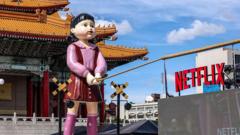The nation is preparing for a presidential runoff that could elect its first non-left wing president in nearly twenty years, signaling a significant political shift.
**Bolivia Poised for Political Shift with Potential First Non-Left Wing Presidency in Two Decades**

**Bolivia Poised for Political Shift with Potential First Non-Left Wing Presidency in Two Decades**
Bolivia's upcoming presidential runoff may end a long-standing socialist governance, leading to foreign investment shifts and domestic reforms.
In Bolivia, Senator Rodrigo Paz Pereira of the Christian Democratic Party is emerging as a potential change agent in the first round of presidential elections held on Sunday, edging ahead of former president Jorge Quiroga. These preliminary results indicate a departure from nearly two decades of governance by the socialist party, Movimiento al Socialismo (MAS), suggesting a historic moment for the nation.
Neither candidate secured the majority needed for an outright victory on the first round, leading to a runoff scheduled for October. Paz Pereira's unexpected rise as the frontrunner challenges pre-election predictions which had indicated businessman Samuel Doria Medina was more likely to lead the pack. His campaign emphasizes fiscal decentralization, corruption fighting initiatives, and an economic slogan promising "capitalism for all, not just a few," alongside proposals for expanded credit access and reduced import restrictions on non-domestically produced goods.
Meanwhile, Quiroga, who has historical ties to military leadership as a former vice president and interim president from 2001-2002, represents continuity in a more conservative capitalist approach, potentially steering Bolivia towards enhanced foreign investment in its critical lithium reserves—essential for modern technology applications.
Amid economic strife marked by shortages of fuel, food, and rampant inflation, public sentiment appears to favor a political reset. President Luis Arce, whose administration is struggling with deep unpopularity, opted not to run for re-election. Individuals voting for change showed their frustration by booing MAS candidates at polling sites. In a symbol of the left's challenges, violence marred the electoral process, with reports of booing and stone-throwing directed at left-wing candidates and an explosive device detonating at one polling station without serious injuries.
Critics of the left assert that the movement is divided and faltering in the face of economic hardships. Evo Morales, the iconic former president and architect of MAS policies, has been barred from seeking re-election and has asked supporters to nullify their votes. Although Morales retains a fervent base, a split within the party signals a changing political landscape.
The relationship between the U.S. and Bolivia may evolve if a non-left candidate assumes power after two decades of alignment with countries like China, Russia, and Iran. This precarious political environment, coupled with the MAS party's internal fractures as seen in its power struggles and controversy surrounding Morales, may herald a new era for Bolivia that shifts away from left-leaning policies to embrace a more capitalist, U.S.-friendly stance.
If historical patterns hold, the upcoming elections may not only redefine Bolivia's governance but also its position on foreign policy and economic strategy, reflecting changing voter priorities in a nation eager for transformative leadership.
Neither candidate secured the majority needed for an outright victory on the first round, leading to a runoff scheduled for October. Paz Pereira's unexpected rise as the frontrunner challenges pre-election predictions which had indicated businessman Samuel Doria Medina was more likely to lead the pack. His campaign emphasizes fiscal decentralization, corruption fighting initiatives, and an economic slogan promising "capitalism for all, not just a few," alongside proposals for expanded credit access and reduced import restrictions on non-domestically produced goods.
Meanwhile, Quiroga, who has historical ties to military leadership as a former vice president and interim president from 2001-2002, represents continuity in a more conservative capitalist approach, potentially steering Bolivia towards enhanced foreign investment in its critical lithium reserves—essential for modern technology applications.
Amid economic strife marked by shortages of fuel, food, and rampant inflation, public sentiment appears to favor a political reset. President Luis Arce, whose administration is struggling with deep unpopularity, opted not to run for re-election. Individuals voting for change showed their frustration by booing MAS candidates at polling sites. In a symbol of the left's challenges, violence marred the electoral process, with reports of booing and stone-throwing directed at left-wing candidates and an explosive device detonating at one polling station without serious injuries.
Critics of the left assert that the movement is divided and faltering in the face of economic hardships. Evo Morales, the iconic former president and architect of MAS policies, has been barred from seeking re-election and has asked supporters to nullify their votes. Although Morales retains a fervent base, a split within the party signals a changing political landscape.
The relationship between the U.S. and Bolivia may evolve if a non-left candidate assumes power after two decades of alignment with countries like China, Russia, and Iran. This precarious political environment, coupled with the MAS party's internal fractures as seen in its power struggles and controversy surrounding Morales, may herald a new era for Bolivia that shifts away from left-leaning policies to embrace a more capitalist, U.S.-friendly stance.
If historical patterns hold, the upcoming elections may not only redefine Bolivia's governance but also its position on foreign policy and economic strategy, reflecting changing voter priorities in a nation eager for transformative leadership.


















